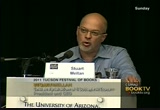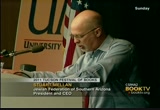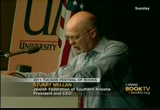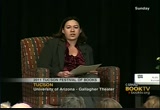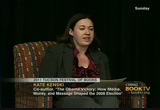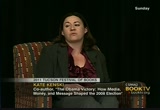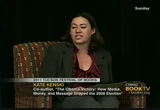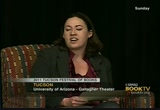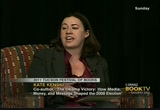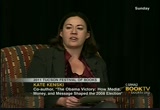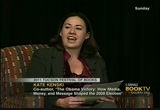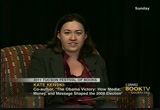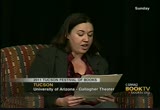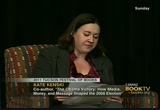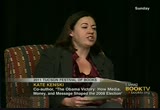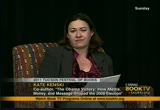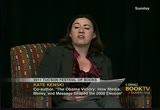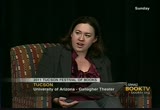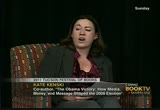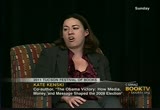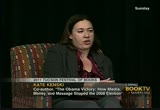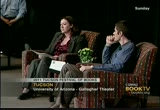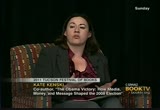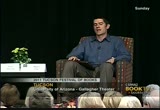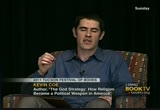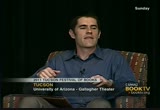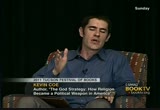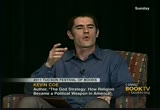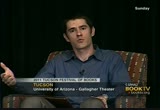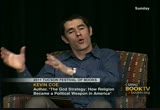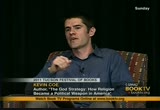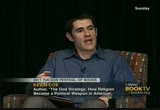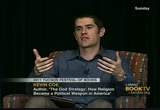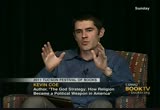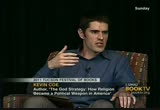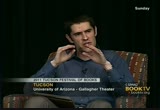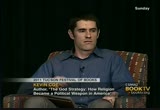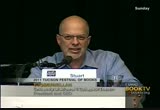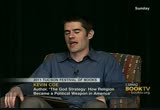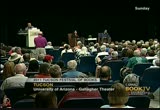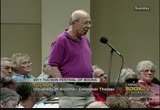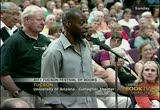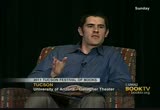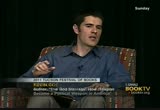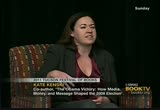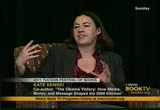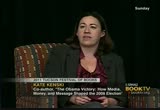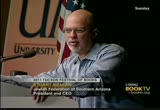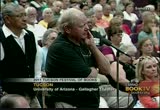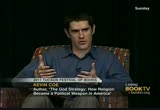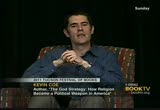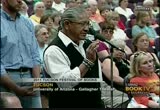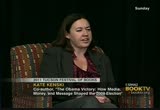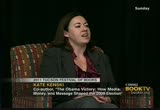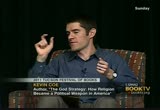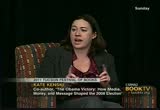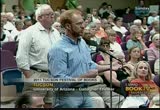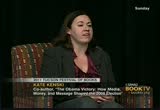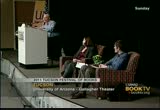tv 2011 Tucson Festival of the Book CSPAN March 14, 2011 7:00am-8:00am EDT
7:00 am
we have the good fortune of doing so by listening to individuals who are a uniquely prepared to provide us with insight. those of you who are to some onions understand daily but a rich resource this university is and this session is certainly a good example regardless of whether the cats when. university professors from the department of communication to address our topic. k -- kate kenski teaches politil communication, public opinion, and research methods. she was previously a senior analyst at the annenberg public policy center where she served as a member of the national election survey team in 2000 and 2004, which provided material for her first book entitled capturing campaign dynamics.
7:01 am
she has authored numerous publications examining the predictors of campaign outcomes and her new book is entitled "the obama victory: how media, money, and message shaped the 2008 election". here it is. i'm holding it up for you. it is on sale outside. reviewers have said detailed and thoroughly documented fitting for students and scholars but highly acceptable language for the general public. the best analysis of the presidential election in recent history. it is a game changer for scholars, punt, and strategists. we all need to buy the book. our second panelist is kevin coe whose ph.d. in communication from the university of illinois. his research and teaching focus is on the interaction of the american political discourse, news media, and public opinion. in addition to his many scholarly publications he has written opinion pieces on a wide
7:02 am
range of popular news alice such as the chicago tribune, baltimore sun, and times that,. the publication of his book, "the god strategy: how religion became a political weapon in america." here we go. how religion became a political weapon in america. reviewers have commented, a well-written meticulously researched and i opening examination of how u.s. politicians use religion to win votes. if you are at all curious about how influential religion has become in today's political arena, you need to read this book. another review called the book absolutely brilliant, fascinating, timely, and of great importance. it's so absolutely buy that book, too. still as you can see, we have a lot of expertise to bring to today's procession teach -- session. professors want to leave plenty of time for discussion. they will be beginning, and you
7:03 am
can get your questions ready. at think we will start with dr. kate kenski, who will focus in on the 2008 election and factors that help us understand the outcomes of the elections and then dr. kevin coe will bring his focus in on the influence of religion in politics today. >> thank you much. i'm very much appreciate being here, and thank you for having us. from among the thousands of words that were spoken in the 2008 election might co-authors and i think that we pretty much mail down which words were most consequential during the campaign at various times. we think that how the candidates knew what they could have seen from the polls after words they perhaps would have changed their phrasing at times. for senator mccain that would have been the phrase the
7:04 am
fundamental of the economy is strong. now, interestingly enough as often happens when people say certain phrases you cannot guarantee that how you mean a phrase is how other people are going to choose to interpret it and have your candid it will go on to spend it. for him, that phrase occurred at the moment without what he meant and at a time where people were concerned about the economy, which is one of the most important issues in this election. we think that if barack obama could rewind:00, it would have been the time where right before the final presidential debate when he was campaigning in ohio and came across a so-called joe the plumber and made the statement, i think when you spread the wealth around it is good for everyone. now, again, one can't necessarily guarantee how people will use one's words. both of those were very telling
7:05 am
moments or the opposite side used those phrases to gain traction. in the obama victory what we do is try to document the twists and turns of the election coming from schools of communication we think it is important. what is interesting is, not all people who said the elections actually think that messages matter. in fact, if you go back through most of the literature from political science you will find that it's only, again, recently that communication has been considered an important role. now, the average citizen thinks this is crazy because why would people spend so much money on advertising, for example, if it does not matter. but the committee for a long time has banked on the idea you can predict outcomes of elections in advance. so if you could do that why would you need to actually steady if campaigns matter?
7:06 am
the presumption was that they didn't. you could predict them off of what we call retrospective voting characteristics. that is, if you knew how the economy was going you could assume that if it is going well the president or the party of the president in office would get the benefit. if the economy was not doing well people would penalize that party regardless if the party put forth a different candid in the race. and that actually has been a very good predictor, generally speaking, of the vote. not in terms of size, but who can win. and so and interesting phenomenon in the field of elections is that there really have not been appropriate data sets to show the extent to which messages matter. using data from the national election survey which started in 2000 my colleagues and i have been able to document all those twists and turns.
7:07 am
over 2008 over 100,000 interviews were conducted with citizens of the united states. this has allowed us -- i should also mention we are in the field almost every day. we are able to attract public opinion across time and see how people respond to messages, see how they feel about candidates, and in doing so way on top of that what we know is going on in the communication environment and in doing so what we can say is certainly there are things at the outset of any given election that helped predict things at a time. but if you don't understand the communication you miss out on a lot. consequently in 2000, for example, all but one of the major political science models were wrong. so what "the obama victory" does is we picked up a presumption that a background characteristics matter to some extent, but what else matters?
7:08 am
background characteristics, no question that calling in to the 2008 election whoever was going to be the republican candidate had a mountain to climb. first of all, the flaws dissatisfaction with the direction the country was going. there have been major -- major changes in party identification, that is the levels of party advocations of republicans from 2004-2008 making it a lot harder for any republican to count on a base, the republican candidates would have to do a lot more. and to be specific, about george w. bush, his favorability ratings were not only not strong, during that election they were in the mid-20s, which is certainly not where the republicans would have wanted to be. those background factors to make a difference, but we are able to show that they account for about 75 percent of people's vote choice. that means that there is a
7:09 am
strong remaining 25% left to explain. some selections are often won on small margins communication matters. limitations of the candidates. we document, for example, two things important about mccain that obama went after. one was that mccain with the same as bush and that if you voted for mccain it was the same as a bush third term. now, interestingly enough out of all of the candidates that could have been chosen mccain was decanted it that the obama team feared most. demonstrated significant breaks, it was john mccain. so they had to convince the public through rhetoric that the two were won in the san.
7:10 am
the other thing that they did was solely to emphasize mccain's page. now, it would be politically incorrect, of course, to say someone is too old to do anything, but there are very subtle -- i don't even know if there are subtle, but indirect ways that one can imply someone is too old to serve. it should be noted that the obama campaign was actually not the first to bring up mccain's age in the 2008 election. it was actually brought up first by a hiker be supporter flu in january of 2008 said if john takes over the presidency at 72 and the ages three to one, how old will he be in four years? you will be 84. [laughter] some newspapers are also picking up on this. interestingly enough just
7:11 am
mentioning aids. you read the newspaper and it says so and so, 22. whatever the age is. 55 percent more inclined to put that qualifier when reporting on john mccain. these differences were consequential because people who read newspapers were significantly more likely to think that john mccain was too old to be president when you control for other factors like party identification and background characteristics. it makes a difference how newspapers report. also exposure to campaign news, widely creating the impression that john mccain was too old. not only that, but the percentage of people who said john mccann was too old to be president increased by 10 percent across the general election. when you put that in model it shows that they simply were not going to vote for the republican ticket.
7:12 am
on obama's side what they do to facilitate that impression, they did things by having slogans that would mention old allot in reference to john mccain. here are some various campaign ads. john mccain is blaming barack obama offer of gas prices, the same old politics. john mccain, he has been in washington for 26 years. john mccain, same old politics, same failed policies. working for the right, that's the left, old washington dance. whatever it takes, in washington celebrity playing the same washington game. for 26 years in washington john mccain has played the same old game. and so, as you can see, very subtle ways to prime that impression. what we document in the book to show that impression increased across the campaign. as obama, for his part, when
7:13 am
mccain first won the nomination, did emphasize that now i believe john mccain is a good man, a genuine american hero and we honor his half century of service. after seven and. [laughter] again, none of those are factually incorrect, and it's hard to document exactly is being targeted for that purpose. what we can say is these things changed across the campaign. now, on the other side of things that we document, for obama it was a question of whether or not he was ready to lead. that was one. now, the same with the mccain problem. with obama this ready to leave charge was not started by the republicans, but hillary clinton. you might remember the 3:00 a.m. add. showing -- and other reasons,
7:14 am
but one of which -- well, basically the girl came out as an obama supporter. but that aside what hillary taunton was trying to do was suggesting was not quite ready and did not have enough experience. those charges were put at his feet. when people bought into those impressions it certainly hindered his ability to capture votes. another thing against obama i want to touch on, and both sides made use of viral e-mail, was questions about religion and citizenship. one of the things as we look to the future of trying to get a handle on viral e-mails kamala all of my things which can be monitored by news media where if something is unfair, something has recourse, by wrote the malls are harder to track and stop. it basically evidence the distortion about obama's financing and citizenship and
7:15 am
several e mailings that travel through the web. n1 moment in the campaign john mccain was actually taken back by a female questioner who posed the following to have. she said, i don't trust obama. i've read about him. he is arid. so senator mccain, no, ma'am. no, ma'am. he is a decent family man. a citizen i happen to have disagreements with. that is what this campaign is about. he is not. thank you. there are moments like that in the campaign where each side showed some restraint. facilitating the impression that obama was arabic did have consequences for people who believed, much less likely to support him. our campaign found during the election 22% of people actually did believe the statement that senator obama is nearly half arab.
7:16 am
when people believed that statement, that he was arab or muslim, about 25% would still vote for him, but 64 percent said that they would not or had not. so when these e-mails spread it they tend to spread among people who have like minds, but sometimes they do get out, and when they do there are consequences. other crimes that were consequential about a rock obama, one was barack obama as a muslim, fowls of around with terrorists, that one was said to have traction, those statements, once people believe them it was hard for them to say, okay, i'm going to vote for them. at other viral e-mails, charges laid against obama, one was about him being the antichrist. it is stated in the bible that
7:17 am
it will happen sooner or later. this man fits every description from the bible for the antichrist. born tough black muslim from kenya and a white atheist from wichita, kan., obama takes great care to conceal the fact. sworn in the senate, not on the holy bible, but instead on the crown. then, of course, other questions about his birth. these are things that are hard to stop, hard to monitor, and some people have pointed out that sometimes people say they believe things mainly because they don't believe them 100% but want to express some kind of frustration against the other side. in doing so ideas it facilitated and it has consequences of the electorate. one final thing that i want to adjust tap before i turn things over to kevin is the role that advertising played in the 2008
7:18 am
election. in the 2008 election it was anticipated in the spring that barack obama would expect to have public financing. he did not. in doing so he ended up being able to spend about twice as much on advertising than the mccain campaign. the mccain campaign did accept public financing. those dresses were consequential. for example, in mid october it meant that obama was able to outspend mccain on advertising to to one on broadcasting, one and a half to one on cable and nearly five to one on cable. that is a very consequential moment in time because early voting had started to take place and we had higher levels of early voting that we ever had before. over one-third of voters cast their ballots before election day. so again, when certain charges were made, when a candid it is able to spend a certain moment,
7:19 am
there are consequences. another thing is the realm of advertising. what you think you know about the campaign might not necessarily be accurately reflected on the news. that is, regardless of who you supported, if you think your candidate's campaign was squeaky clean, a place with the probably bore not so upset with the claim was mike for targeting on radio. as it turns out, the news media tends not to focus quite as much on radio. what we know about radio was that people turned to radio stations for particular reasons and demographic is very much correlated with musical preferences. what that means for people and campaigns is they can find people letter trying to reach based on certain to graphics. if you want to go after bob white moderate females there is probably a radio station for just that, not be labeled as that, but there is one out
7:20 am
there. what that means is you don't get the full slice of what you're seeing in broadcast news. so what was called out in a radio that did not receive as much attention was the abortion issue. when it sarah palin was selected there was some initial attraction from white moderate and conservative females. so what the obama campaign decided to do was put a lot of the questions about abortion on radio and the reason is this. when you make a statement about where you stand on an issue you hope you attract people like you want to attract, but you can potentially mobilize the other side. the reason why you want to the but hard-liners on things that you believe and and keep it hush of the national stage is something like abortion, a lightning rod. if someone says i am pro-lifers and everybody learns about it it
7:21 am
can mobilize the people who are pro-choice to make the opposite decision. that was the fear talking openly about abortion. he tried to convince the moderate females that john mccain is pro-life so that they think twice about moderate females being more pro-choice and mobilizing the other side putting those charges on radio. you can target who you want to target without that mobilization of the other side. that is what i think we can anticipate in the future, a lot more micra targeting. it was effective in the 2008 campaign. just some final thoughts about how campaigns are one. one thing we do make note is that the elaborate on people's predispositions. very unlikely that they will change someone's issue position on things that are fundamental. if you support public work, chances are i'm not going to gain traction in telling you we
7:22 am
need to completely cut back the budget on public works. what campaigns can do is elaborate on people's predisposition. when they don't do that you have the 2000 election were by all accounts board should have won had the economy been primed in the right way. he did not and therefore he did not receive the benefit. in 2008 again that elaborate spending. what we are able to see is obama was able to make use of predispositions the people already had. stars were aligned for the democratic candidates, but that did not mean he could not lose it. there were a couple of moments with twists and turns where mccain basically came post parity with barack obama. in some ways that is an amazing thing about the election. there were these moments when things did narrow and get close. three things such as advertising and elaborating on the
7:23 am
predispositions as effectively as the obama campaign did he certainly won the election handily. thank you. [applause] >> i'm very happy to be here, too. -to start by saying, i have the opportunity to read cates book cover to cover. it's tremendous. i can't recommend it highly enough. i'll highlight the role that religion has come to play in american politics, one of my primary areas of research, u.s. politicians and especially presidents use religion as a means of appealing to the public and ultimately attracting voters. i'm sure it comes as no surprise to you having no doubt watched political campaigns that politicians will used religion strategically as a way to appeal to voters. by saying that, i don't want to suggest that when they use religion they are being
7:24 am
disingenuous because it happens that our presidents have been man of devout faith, and i have no reason to think that their invocations of god, for example, are insincere. i think they are quite sincere. at the same time, as president and someone in the public eye, you have to think carefully about all communications, religious or otherwise. in calling what my co-author and i called our book, "the god strategy," we are recognizing the fact that presidents and politicians have to think carefully about how they will use religion to try to appeal to voters. what i would like to do today is give you a sense of how president obama has used religion in some ways that are similar to his predecessors and in some ways that are quite different from his predecessors. to do that i need to start by briefly talking about some of the more broad changes that have taken place over the last several decades and how
7:25 am
politicians and specifically presidents have used religion as a way to appeal to voters. these changes are documented in the book, and what we did in this book was we went all the way back to franklin roosevelt and looked at every single president since franklin roosevelt through george w. bush. what we tried to do was think of every possible way that we could measure public religious acidy. what presidents invoked god in a speech, when they talk about the bible, scripture, when they use terms like a blessing and pray and so on, broader faith terms. retract how often do but go out and give a speech to me specifically religious audience in a church. retract the number of times there would issue proclamations that dealt specifically with religion. we even went so far to look up how the public will mark the occasion of christmas. we tried to think of every
7:26 am
possible way we could measure up president's public religiose city to measure whether or not there was a shift in how presidents did this over time. after poring over thousands and thousands of public communications on different measures it turns out the pattern was the same again and again and again. the pattern was the was a tremendous increase and president's public religiosity beginning with the election of ronald reagan in 1980 and '81 and continuing through every president since regardless of party. bill clinton was more or less identical. so we found this pattern. and to just give you a few concrete examples of some of the trends that we observed, specific numbers that will help us make sense of this what i think is quite a major shift, references to god in the typical major presidential address from franklin roosevelt through jimmy
7:27 am
carter, about one reference to god, one indication of god is a typical major presidential of best since reagan took office, there have been about three. in the broader faith terms, tossing, pray, church, bible. we looked at 50 of these terms. president jimmy carter and before which use about six terms. since reagan took office that number jumped to closer to 11. these are a couple of the shifts. let me give you a few more examples. the number of times in an average presidential term since ronald reagan came to office that the president would go out and speak to a religious of the -- audience roughly tripled from presidents that precede reagan. the number of ties presidents would issue a proclamation of roughly triple as well. in terms of looking at christmas communications retract just the number of references to jesus christ, not caught in general,
7:28 am
but specifically jesus christ because certain members of the public have had a concern that christ has been taken out of christmas and we wondered if presidents had responded to this. it turns out that since reagan presidents have. they roughly quadrupled the number of times and christmas communication that they reference priced specifically. we saw this pattern again and again. what helped us make sense with some of the changes in the electorate that were happening just before ronald reagan took office, and those changes were largely driven by a group in society that for a long time felt like their views were being marginalized, and this group has come to be known as the religious right, politically conservative christian citizens who felt like they needed to start engaging in the political world in no way they had not been because they felt that was going to be a means to shape society in a way they felt was appropriate. groups such as the moral
7:29 am
majority emerge in the late 70's, and ronald reagan is the first politician who finds a way to harness the shifting attitudes among that voting bloc and speak to them and a way that they respond to. presidents cents have follow that model and tried to speak to those citizens in a way that is compelling. .. i don't have all the evidence yet. we're still collecting data on barack obama. but, of course, he's been in office for two years we do have some preliminary answers we can offer on this question. let me stress to ways that are similar to presidents since reagan, it into ways that he is different from president since reagan. first lady is similar is on what would probably be considered a fundamental measure of publicty
7:30 am
religiosity and that is the the indi indications ofca god and the implications of the faith more broadly in your major publicm aj speeches.u so as i said, presidents reagan and those sense had used about three references to god to god in the presidential address. obama is right there with him. he's used about two and a half so that puts him below ronald reagan and george w. bush and just above george h. w. bush and bill clinton. so he's right there in the mix with the presidents. very similar in that way of expressing public faith. in terms of the state terms, the broad terms, bible, pray, blessings, so on he's the highest of any president in modern history just slightly higher in bill clinton who used about 12.5% in the average speech. barack obama uses 13. ronald reagan and george bush were right there as well. so he's very typical, very similar to the most recent presidents in the new model of public religion in that respect.
7:31 am
let me give you another way similar to read this 1i think will some obvious at first but there's a little new ones that i will try to add. barack obama if you listen to any major address he has given - since he came into office. he will close that address by saying god bless america. usually god bless you and god bless america. and that is as i said pretty obvious because every president it seems closes, not president but politician closes a major address in that fashion. it turns out also that freezing, that signature closing mind now as presidential speeches accretion of the ronald reagan presidency as well. in fact that had been used one time prior to ronald reagan taking office in any major presidential address that happened to be richard nixon after he was closing the address during the watergate situation. [laughter] and this is here. perhaps they sought after that one of use avoided. but none the less ronald reagan does bring it back and by the
7:32 am
end of his presidency he's using it to close every speech, every major speech and george h. w. bush as the same, clinton does the same. the most recent president bush as well and then obama picks up and does the same thing. the reason this is somewhat interesting and not as obvious as it seems is barack obama came to this language a little bit later. during the campaign early on in the campaign in fact it was rare for him to close a speech with god bless america and then questions began to surface of his patriotism. there was the jeremiah wright controversy, that khayat questions and he started taking it very public step to signal his patriotism. one of those is he began wearing a flag lapel. you might recall that came along made a campaign and another is he started closing the speech with god bless america and that continued into the present. to huessy is typical in his use of public religion here are two ways that he's a typical, he's quite different than the past for presidents.
7:33 am
the first of those is that he has brought into the category that make up the public religious sphere and the way he did that was straight away in his inaugural address. let me quote from the inaugural what he says in part is we are a nation of christians and muslims, jews and hindu and non-beavers. and the last word is crucial, mom believers and the reason it's crucial is if you look at every major presidential address going all the way back to franklin roosevelt more than 400 addresses we examine that is the only time, the only time a president has mentioned a feast on believers in a positive context. they've been mentioned before but it hasn't been favorable. but obama brings them into the fold and this is well received in many sectors of the republic. they appreciate the broadening in some sectors that was brought up as a concern but nonetheless it does set him apart not just
7:34 am
the immediate predecessors of all presidents going back to franklin roosevelt and i respect all presidents connection george washington. i doubt if i positive reference at any other moment even before fdr and that is one way obama is different. here's the second way. this has to do this public communications marking and it's easy to dismiss christmas speeches by president as meaningless because of course they don't draw large audiences. love people are not paying attention to be sure. yet there are perfect opportunities for a president to signal to those people who are paying attention who are looking specifically to see the president shares their faith and people do pay attention for that reason and when presidents don't perform correctly they are notified. as an example, in 2005, president bush sent out a call with a card instead of a
7:35 am
christmas card and this created quite an uproar among certain sectors of the public because they were concerned that he was taking the christ out of christmas. the other christmas communications i tallied them up. he's not taking christ of christmas but nonetheless in that moment when it seemed he was they heard about it so people do care very much about these communications. here is how obama has been different in using those to the typical past for presidents, so ronald reagan for bush jr. what they've done is they've given to the major christmas speeches. when they get on the lighting of the national christmas tree and this is a regular briefing they give that this event and the other benefit is a formal statement closer to the holiday itself. so two primary christmas communications, and in these speeches the past four presidents have averaged about for at the lighting usually and then the rest showing up in the
7:36 am
christmas statement. ronald reagan, to give the one extreme case, and one of his formal statements mentioned christ 31 times. so there is clearly a degree to which presidents have been trying to put christ beckon to christmas in these messages here's what obama has done. in both his first two years in office he did not issue a formal christmas statement. he gave brief remarks of the lighting of the christmas tree and each of those mentioned christ one time so quite a sharp drop-off from the 12th typical for the past four presidencies obama just one mentioning in each of his single christmas communications. so quite a sharp contrast so that's where obama fits in and the preliminary story on where he fits in the puzzle i will leave you some questions the puzzle i will leave you with is actually something that stewart brought to begin which is a few research center poll that asked
7:37 am
americans but is the president's religion. do you happen to know what barack obama's religion is. and so as stuart mentioned, part of the stunning finding that they found in this poll was that 18% of americans believe barack obama is a muslim so that's striking its own right but what i think is just as striking he's only 34% of americans could give the correct answer that he was a christian. only 34%. so in other words, the vast majority of the public does not know that barack obama is a christian so this seems to be some kind of a failure of religious communicating and yet, as i began by saying in the most public ways barack obama is all but identical to the past for presidents, invoking an dodd and using the broad language of faith to the same degree as other presidents. so there's a puzzle here that perhaps we can wrestle with.
7:38 am
i have some ideas but i will save them for now. thanks. >> thank you very much. [applause] >> both a blessing and i say that so i can meet my quota. [laughter] >> weidinger both wonderful, too. microphones are at the ogle and we very much appreciate hearing from some of you even if it requires squishing out while we are getting situated and pick up on that. there's that old adage if you repeat often in life it becomes feasible and it feels like that is underlining some of this conversation about the rumors that fly it around the fire early on the internet. so is that just consistent in our history with the communications were is it a new dimension because of the world
7:39 am
we are living with in our communication devices? >> i will just say the idea of the whisper campaign goes back as far as politics so there have always been attempts to tell him very quietly negative things about the opponent and hope that circulates from person-to-person as kate pointed and gets into some tremendous detail in the book. it's the changing technology now that facilitates these kind of campaigns and the way we haven't seen. >> i would add to that that with so many different media choices interestingly enough, probably 20 or 40 years ago if you had asked is media choice a good thing or a bad thing is a great thing, why would it be a problem? and interestingly enough, there are other studies which document the trees we have and in some ways the more we become disengaged. the other problem related is we
7:40 am
often can't track back where we think we've heard something. we hear people for a simple citing saturday night live as though george bush had actually said something that he didn't say. [laughter] and again, in their mind they remember what they think is consequential part and they don't necessarily attributed to the right source and that is why i think things in the media and firemen are particularly confusing. >> we ask you keep your questions brief and start with this gentleman here. >> do you think the day will never arrive when an atheist could be a legitimate candidate for president? >> that's a very interesting question, the polling right now suggests that if the date does our life it will be a long time down the road because the reality when you ask the question about the various groups that people would or would not elect as president of this is a regularly last question to the u.s. all things being equal what we elect a
7:41 am
woman or would you like the muslim and so long, tedious are actually the lowest. they are the symbol of lowest group in most of these polls that come out. so i think the reality is we probably will get to that point. it is a long way off. specs before. yes? >> how do you square the widespread misrepresentation by the obama haters with his muslim religion with the primary equally widespread misrepresentation that he was a disciple of african-american christian antiwhite church. >> that's a great question and gets to kate's point of the different media sources, fi rall e-mails and different segments of the election turning into the different messages so some are going to be more likely to hear the one that would be the
7:42 am
muslims and others might be more likely to hear the other. we also have to be about the fact some people are just going to be willfully ignorant and not willing to put that point together that you couldn't be both. you couldn't be member of a problematic christian church and a muslim. [laughter] >> thank you again for both of your comments. my question is similar to the last gentleman. after reading dreams of my father, his biography and the audacity of hope, you find the picture of a public intellectual who in very many ways appropriated the african-american church and all and wanted to inform his intellectual growth. i am kind of wondering why that never got across to much of the population. i mean, he kind of brought his way and not just in to our modern politics but very much into the african-american experience and became his lightning rod for all of the hopes and dreams of the entire
7:43 am
people we don't think about outside of hbo. so i'm kind of wondering why that didn't really get across. you just said you can't both be this sort of a feast person who can't stand religion you know, this member of this violent christian sector but at the same time people completely ignore religion in general with him. so i am just wondering what the was all about. >> it's a good question. and i think that again it probably has to do with some divisions in society where there is a group and presumably that's the group that is the 34% reporting christian this pretty well versed in obama's religious history. they are the group that would also probably be more supportive of him that has followed his conversion story which is in some very well known. >> he came to the church later in life and so on and he's certainly not been shy about visiting public forums during the campaign. he had several public forums
7:44 am
where he shared that story but i think there were large segments of the electorate who wouldn't be turning into that message and wouldn't be hearing it. and then also during the last campaign religion has become familiar by that time part of campaigning that there was an increased his events by the news media to tell the same religious stories. so i think by the time it got to the campaign they felt like the had covered the obama story enough your bringing in new pieces and the latest scandals and so forth so they were not necessarily going to be replaying that converging story and so forth. so it's both the public involvement in how the media present the matters as well >> at least when the reverend wright controversy emerged at different times of the campaign there's the initial hit for the controversy obama gives his speech but reverend write a much
7:45 am
later appears again and there was a lament the public was aware because they were openly discussing it in the context of reverend wright. so it can be made if the media choose to cover it when they don't cover it and the main message is coming through firewall e-mail. it basically facilitates among people who aren't likely to try to support him any way, but the concern of course is de convinced the people that are undecided on the margin it can make a difference. so part of it again the media cannot i think cover religion in that circumstance they did and it didn't work through obama's benefit. >> my question is probably more for kate. i was wondering in your research and found or looked into the role of the social networking on the obama side of one of the
7:46 am
younger voters i think was apparent how that played a role in what might possibly play a role in the future elections as we see the increase in the media source. >> yes. in some ways though a superficial level. this is something the media scholars are having a hard time struggling. whenever you do a study and you want it to be meaningful study it needs to be based on a representative population. and trying to figure out how to capture a representative population on social media and that population is doing is incredibly difficult. rather than to track exactly what people were doing is impossible. what we do try to do our track what we consider an eligible to claim as they appear and backtrack where they came to be. and so what we did find was they could be used negatively again through things like fire will e-mails. but also to the politics and so
7:47 am
for example one of the ways in which the obama team positively used the new media whether it was through social means or just e-mail was getting people to vote early. what we found is the people receiving e-mails from the campaign, the obama campaign i should say, significantly more likely to show up before election day helping him put votes in the bank. since about two-thirds of the state have early voting that was one way in which although he did quite hard towards the end, he really had been quite a bit in the bank about three weeks before the election right when mccain finally found the message that did work which was joe the plumber or wealth redistribution argument but it was too late, and again, for whatever reason people who received e-mails from the mccain campaign it didn't give him that same boost that the
7:48 am
obama e-mail had done and so for whatever reason and this is controlling for demographic factors which not just young people likely to vote for obama but even controlling for those factors for whatever reason the obama campaign was much more effective if using the new media to get out the votes. >> one of the dynamics of all of the e-mails at phill airport in boxes is that some of them we stand on it seems whether or not we believe they are true. we just -- i mean, i see this line print will send around and they feel no responsibility to check whether it is true and if they find out it wasn't true it doesn't seem to bother them that they sent it around. so i don't know how this aspect of what's just circulated and see if it fits into our changing landscape. >> and it fits the whole notion of rumors. think about the average high school. people say something about someone else without checking the facts.
7:49 am
and of course we do that in our daily lives, too and so that is just an extension of something people already tend to do. >> i was just interested can you identify a period in time in recent history when the religious right appropriated such as homosexuality and abortion and began to use those as litmus test some or wedge issues in their local activism? >> prior to the most recent year the? the trajectory of the religious right and the scholarship on this has been and the emergence in the late 70's not directly in response to roe v. wade. that is a misconception directly in response to that. that was part of the story but there were other things happening as well in fact some
7:50 am
of the earlier court decisions taking out of school for a civil happened in the 60's. those start to make some movement towards the citizens mobilizing but that emerges more powerfully into the 80's and i would actually say that it seems to have peaked and perhaps in 2004. i don't want to suggest that it has peaked and then disappearing because with the pattern has been usually is a rise and fall in the influence of the religious right such that was especially journalists they like to write the obituary of the religious right every six to eight years and then sure enough, two years later it emerges in a more powerful forum so it's been a fairly recent phenomenon and one that has come on and fallen off and come on again. >> and is there a generational divide in terms of what
7:51 am
resonates? >> in terms of residence, yes. so, the polling suggests the younger generation of voters right now grew very tired of the old guard of the religious right, so the older faces like jerry falwell and so forth the didn't play as well if the younger set and the issue is what didn't play as well, you mentioned a marriage as one of the issues that had especially in 2004 played a role would. if you do the polling on the younger generation that is just gone, the younger generation are mostly supportive even in areas where other older groups are still a absolutely opposed. younger people are more willing to accept gay marriage, so i think that issue is a good example of one that didn't play well in the younger set and if the religious right is to have a research and it will need to find the next set of issues. abortion is probably here to
7:52 am
stay but it won't be gay marriage. >> thank you. >> my question is concerning politics, but in particular the politics of race. and what our haste of american citizens and to declare a post racial society, do you think that the muslim charge against obama is actually a code word for black that they won't attack him on his race but they can code that attack on him being an african-american. >> that's an interesting question. >> i haven't thought about it as much in terms of the muslim. certainly there are other coded words that come line to get there. for example, in the book we talk about the charges about welfare.
7:53 am
when the word welfare is used, is that used as a code word to suggest something about race going back to the wally 80's, early 90's, the early 90's and there's a lot of discussion about welfare there were questions about that being coded there's no way to test that exactly but it might have some data that can probably try to get at that very thing. what is clear is when people say things like muslim they tend to focus on things like is the president a safe person to vote for him? and there's a series of claims that once you get in to muslim that is if you believe barack obama is muslim, there is a correlation that he proles are
7:54 am
not with the purists and then there's a question about that undercutting his ability, is he going to believe in a country that is in the middle of the war etc, etc., but i think that is an excellent point. and coating it is hard because of course even when it comes to welfare, when they talk about welfare the mean how should we redistribute and to whom has a financial question. there are people when they talk of welfare they are more concerned that the racial aspects, and our certain groups getting favored some and really how to parcel out is incredibly difficult but certainly one that is worthy of study. >> i really appreciate your commentary on the new media strategy and i was interested especially with you, dr. coe of correlating the rise of this sort of messaging evin to the
7:55 am
advent of the 24-hour new cycle and i would be interested to hear how you see the news cycle for testing and more specificity facilitating. >> we have a two-minute signal so keep them brief. >> it's a great question and you're right. there's a relationship between the two things. but the rise of more selective exposure on the media people opting into very specific traces for the media and ignoring everything else that is what it's an environment where politicians can find very homogenous demographic groups and know where to find them and it gets a little bit to indicate's point of radio advertising where if you can find just the right group you can tailor your message in a way that you just couldn't two decades ago because you didn't know enough about that group or that -- i will let kate follow-up. >> one thing i would add is we
7:56 am
are now no longer really talking about 24-hour news cycle. and they tend to think it is our hourly news cycle, and that for them has put a lot of stress on the campaigns and the campaigns we are not even getting into now we have third party groups that have certain rules to play but for the campaigns themselves are incredibly difficult and some of the i think really, really questionable ads on both sides, one on each side and if he would talk to the ad maker i think they would tell you that they made those usually when they've been working 14 hours straight and just went for it trying to respond because if you don't respond it can make you look weak. and occasionally the claims a bit suspicious and so some of it is human error. the more that we expect for the hourly news cycle turnaround there is bound to be more slippage in the search for truth - when it comes to where the candidates stand.
7:57 am
>> we have time for one more question? i think we can get in one more question. sorry that last one will have to be of record. .. i can go find that one message i was looking for. i can tune into the pandora radio station that suits me just perfectly. so how scared are the campaigns of the difficulty of mastering the internet, media message in
7:58 am
the next coming campaigns? and then, -- >> we will have to take it. >> how is the electoral college scared of the internet, or not? thank you. >> i'm not sure about the latter part but what i would say is for some people, change in cha technology and i would say tech someone studying it is i frustrating. you think you know how to mapin out a campaign and i think weamg did a very thorough job with wi this book. 2012 it will be a whole other ball of wax. it requires a lot of shifting. i guess or the older you get, more entrants, more comfortable our understanding now seems, so that's your. but for other people it will bet a world of new opportunity. so with each election cycle again someone else anxiety is someone else's play box for trying something new. cycle, one person's anxiety
7:59 am
is another person's play box to try something new. so maybe people who are not used to the media are coming into the process, there are certainly opportunities for them. >> that will bring things to a close. the comment is buckle up america we're not going back to a gentler time but where we go, politics make us in a call which has a new platform to stand on and our commitment to civil discourse that we can make an impact if i think our panelists for [applause] [applause] booktv has been live all weekend on the campus of the university of arizona covering several panels. if you like to find out more about the festival, visit tucson festival of books.org.
171 Views
IN COLLECTIONS
CSPAN2 Television Archive
Television Archive  Television Archive News Search Service
Television Archive News Search Service 
Uploaded by TV Archive on

 Live Music Archive
Live Music Archive Librivox Free Audio
Librivox Free Audio Metropolitan Museum
Metropolitan Museum Cleveland Museum of Art
Cleveland Museum of Art Internet Arcade
Internet Arcade Console Living Room
Console Living Room Books to Borrow
Books to Borrow Open Library
Open Library TV News
TV News Understanding 9/11
Understanding 9/11